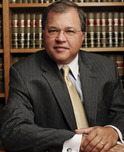Motor Vehicle Accidents
April is Distracted Driving Awareness Month
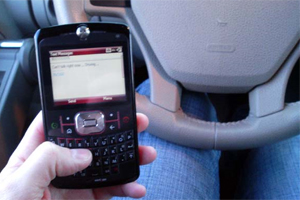 Text messaging while driving creates a car accident risk 23 times worse than driving while not distracted, according to the U.S. Department of Transportation. This statistic is alarming because while texting behind the wheel is a preventable act, more people than ever are using cell phones while driving, to make calls and text.
Text messaging while driving creates a car accident risk 23 times worse than driving while not distracted, according to the U.S. Department of Transportation. This statistic is alarming because while texting behind the wheel is a preventable act, more people than ever are using cell phones while driving, to make calls and text.
Texting while driving is one of the behaviors being highlighted during April’s Distracted Driving Awareness Month: One Text or Call Could Wreck It All. Many states are using the month, sponsored by the DOT, to increase awareness and law enforcement efforts.
In 2010, over 3,000 people were killed in distracted driving crashes. in the U.S. Distracted driving behavior includes texting while driving and cell phone use, but also other activities that take a driver’s attention off the road. This can include: putting on makeup, grooming, talking to others in the car and GPS use. DOT officials ask drivers to consider distracted driving behavior as any behavior that takes your hands off the wheel, your vision off the road or your mind off driving.
But cell phone use gets the most attention. As cell phone users have increased over the years, so have car accidents related to texting while driving and talking on a cell phone. Today, 9 out of 10 Americans own a cell phone and users are getting younger and younger. The National Literary Trust reports 85 percent of children in this country own cell phones, compared to the 73 percent who own books at home.
Some 37 states, including Massachusetts, ban texting while driving. Ten states, D.C., Guam and the Virgin Islands prohibit drivers from using handheld cell phones while driving. No state bans all cell phone use behind the wheel.
Distracted Driving Awareness Month is an opportunity to assess your driving habits. Our Boston car accident lawyers offer a few ways you can reduce distracted driving in the car:
- Do not talk on your cell phone or text message while driving.
- If you are tempted to use your cell phone, keep it in a place you will not answer or check it when stopped at intersections.
- Keep your GPS mounted on the windshield and enter the the address where you are heading before you start your trip. Stop at the side of the road if you need to make adjustments to the GPS.
- If you are using a printed map, familiarize yourself with your route and plan to make stops.
- Keep eating and drinking to a minimum.
- If you are traveling with a child, give them a book to occupy them. If you are traveling with several children, explain how they must behave in the car so you can focus on the road.
- Do not watch videos.
- Do not apply make-up, comb your hair or perform other grooming activities
Related:
- April is Distracted Driving Awareness Month, U.S. Department of Transportation
- The Growth of Mobile Into 2011
- Cell Phone and Texting Laws, Governors Highway Safety Association
Good News for Massachusetts Consumers: SJC Affirms Damages Remedies in Insurance Bad Faith Case
Last week the Massachusetts Supreme Judicial Court issued an important and strongly pro-consumer decision in the case of Rhodes v. AIG Domestic Claims, Inc., 461 Mass. 486 (2012). The decision erased uncertainties created by an Appeals Court decision in the same case (78 Mass. App. Ct. 518 (2010). The decision sends the message that insurance companies will have to pay when they do not treat consumers fairly. Attorney David W. White has written an in-depth summary, which you can read by on our website.
In this case, the plaintiff’s car was hit from behind by an 18-wheel truck. The impact fractured her spinal cord and left her paraplegic. She also suffered broken ribs. She brought claims, along with her husband and her children.
The claims management company was AIG Domestic Claims, Inc. (AIGDC). The company delayed making a settlement offer, then finally made a very low one. Another offer came during trial, this one only slightly better.
The plaintiff rejected all offers and secured an $11.3 million judgement at a trial in Superior Court in September 2004.
Defendant appealed, and AIGDC failed to pay the judgment until after a c. 93A letter was sent and suit was instituted in a second action for violations of c. 93A and c. 176D.
Plaintiff prevailed, but appealed when they were not awarded full damages based upon the judgment.
The Appeals Court affirmed in part, but did not find the proper measure of damages should be based upon the judgement. The SJC granted further appellate review.
The SJC reversed. Affirming its earlier decisions in Hopkins v. Liberty Mutual Ins. Co., 434 Mass. 556 (2001) and Bobick v. United States Fid. & Guar. Co., 349 Mass. 652 (2003), the court held that plaintiffs did not have to show how they would have answered a settlement offer, if it had come. Rather, the court stated, “[i]t has been and remains the rule that the plaintiffs need only prove that they suffered a loss, or an adverse consequence, due to the insurer’s failure to make a timely, reasonable offer; the plaintiffs need not speculate about what they would have done with a hypothetical offer that the insurers might have, but in fact did not, make on a timely basis.”
The court also affirmed the trial court’s findings that the underlying insurer, Zurich, was not liable for violations of c. 93A.
The court held that the underlying judgment of $11.3 million should be the basis of the c. 93A judgment, and that it should be doubled.
Read more about this decision on our website.
About Attorney David W. White and Breakstone, White & Gluck
Breakstone, White & Gluck is a Boston personal injury firm which represents clients who have been injured in car accidents, truck accidents and other accidents. We have decades of experience handling c. 93A claims including insurance bad faith claims in Massachusetts. We look forward to the opportunity to assist referring counsel and clients with their 93A and c. 176D claims.
Attorney David W. White is a partner at the firm and is a past president of the Massachusetts Bar Association. He writes on cases involving c. 93A and c. 176D and is recognized on an expert in Massachusetts insurance laws. He frequently lectures on the insurance matters for Massachusetts Continuing Legal Education. Attorney White is a past president of the Massachusetts Bar Association.
Massachusetts Car Accident Insurance: What Coverage Do You Need?
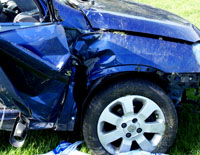 Buying car insurance in Massachusetts can seem complicated, with various types of coverages and state laws which have changed in recent years. The state requires all drivers to carry some level of insurance, but in 2008, drivers gained new buying options as Massachusetts moved away from a highly regulated industry to managed competition. At the same time, insurers have started changing their policies, so not all companies use the standard Massachusetts policy.
Buying car insurance in Massachusetts can seem complicated, with various types of coverages and state laws which have changed in recent years. The state requires all drivers to carry some level of insurance, but in 2008, drivers gained new buying options as Massachusetts moved away from a highly regulated industry to managed competition. At the same time, insurers have started changing their policies, so not all companies use the standard Massachusetts policy.
In the past, the state had set rates. But under “managed competition,” each insurance company can set its own price and compete for consumers’ business.
If you are a Massachusetts driver, you should shop around to obtain the best rates while still buying adequate insurance to protect yourself in a car accident. Here, the Boston car accident lawyers at Breakstone, White & Gluck offer some tips on what to consider before purchasing auto insurance for you and your family:
Compulsory Coverage
Massachusetts requires drivers to buy basic car insurance coverage, including:
- Bodily Injury to Others: $20,000 per person, $40,000 per accident
- Personal Injury Protection: $8,000 for medical bills and lost wages
- Bodily Injury from an Uninsured Driver: $20,000 per person and $40,000 per accident
- Damage to Another Person’s Property: $5,000
Optional Coverage
The compulsory coverage provides insufficient protection for car accidents. These other insurances offer additional protection.
- Bodily Injury: You can buy up to $500,000 per person per accident. If you cause a serious motor vehicle accident, this protects you from claims against your personal property.
- Underinsured Auto: You could be injured by another driver who does not have car insurance. You can protect yourself by purchasing up to $500,000 in coverage per person per car accident.
- Medical Payments: This coverage pays for medical expenses that exceed your $8,000 PIP coverage. You can obtain an extra $10,000 in coverage for a small cost.
- Collision Comprehensive. This coverage pays for damages to your vehicle in a car accident. This coverage is paid by the policy of the driver found to be at fault. Many people choose a high deductible to save money on their policy price, but this can cost you far more if you caused a car accident and have to pay a deductible for your own vehicle.
Click here for information on auto discounts and how to get additional insurance coverage through your homeowners’ insurance policy.
Related Blogs, Articles and Websites
Car Accidents in Massachusetts Would Be Reduced Under Cell Phone Ban
 A ban on using hand-held cell phones behind the wheel was approved by the Massachusetts Legislature’s Joint Transportation Committee this week.
A ban on using hand-held cell phones behind the wheel was approved by the Massachusetts Legislature’s Joint Transportation Committee this week.
On Thursday, the committee voted 8-0 to move forward the bill which advocates say will reduce car accidents, driving injuries and motor vehicle deaths. Some lawmakers did not vote on the ban, which was also discussed in 2010. That year, a new law took effect to reduce motor vehicle accidents by banning drivers under 18 from using cell phones to talk or text. All other drivers were banned from texting while driving.
Under the proposed cell phone ban, drivers would still be allowed to use hands-free cell phones with Bluetooth and other devices. Many safety advocates say hands-free cell phones are safer and this type of ban will help police better enforce the law. Right now, police say it is difficult to differentiate between drivers dialing a phone number and sending a text message.
As a result, police only wrote 1,100 tickets for texting while driving in the law’s first year, according to the Department of Transportation. This averages one for every 200 speeding tickets issued among Massachusetts’ 4.7 million drivers in the same period.
The hand-held cell phone ban will now be sent to the Massachusetts House of Representatives and Senate. The Ways and Means Committee may also consider the financial aspects of it.
If approved, Massachusetts will become the 10th state to ban any type of cell phone use while driving.
The national debate over cell phone use and car accidents has been growing stronger.
In December, the National Transportation Safety Board (NTSB) called for a nationwide ban on driver use of portable electronic devices (PEDs) while operating a motor vehicle. U.S. Secretary of Transportation Ray LaHood said he opposed including hands-free cell phones.
Click here to read more about the proposed hand-held cell phone ban in The Boston Globe.
Read More
Massachusetts Considers Ban on Cell Phone Use While Driving
 Massachusetts lawmakers will consider tougher laws this week to reduce car accidents associated with cell phone use.
Massachusetts lawmakers will consider tougher laws this week to reduce car accidents associated with cell phone use.
The Legislature’s Joint Commission on Transportation will hold a hearing Tuesday to discuss several bills. One proposed measure would only allow drivers to use hands-free cell phones. Another would ban drivers from using any type of cell phone within school zones.
Just nine states and the District of Columbia prohibit all cell phone use while driving. Massachusetts joins 34 other states and the District of Columbia in banning texting while driving for all drivers.
In December, the National Transportation Safety Board (NTSB) recommended a nationwide ban on driver use of portable electronic devices (PEDs) while operating a motor vehicle. The recommendation would ban use of all non-emergency portable electronic devices and the board wants to follow the NHTSA’s model of high-visibility enforcement and focused safety communication campaigns. U.S. Secretary of Transportation Ray LaHood is opposed to including hands-free cell phones in the ban.
Texting while driving, cell phone use and other distracted driving behavior causes a large number of car accidents across the country each year. In 2009, 16 percent of fatal motor vehicle accidents involved texting while driving and other distracted behavior. Twenty percent of car accidents resulting in injury involved distracted driving.
Massachusetts’ ban on texting while driving took effect Sept. 30, 2010. But Massachusetts, like other states, has found its ban hard to enforce. The law bans texting while driving in a moving car, as well as when behind the wheel at intersections. But critics say it is often difficult to tell whether a driver is texting or dialing a number.
Another challenge is Americans are sending more text messages than in the past. In June 2011, more than 196 billion text messages were sent in this country, a 50 percent increase from June 2009, according to CTIA, the international association for the wireless telecommunications industry.
There is research which shows any type of cell phone use engages a driver enough to create a dangerous distraction. A Carnegie Mellon University study found using a cell phone behind the wheel reduces the amount of brain activity associated with driving by 37 percent. And a study from the Virginia Tech Transportation Institute (VTTI) found that headset cell phone use is not substantially safer than hand-held use.
But when drivers text behind the wheel, they are 23 times more likely to get into a car crash than normal, the VTTI study found. Sending or receiving a text takes a driver’s eyes off from the road for an average of 4.6 seconds, which is the full-length of a football field for a car traveling at 55 mph.
Read more about Massachusetts’ proposed bans on cell phone use. Read more about the NTSB’s recommendation to ban driver use of ban portable electronic devices.
Read More
Safe Driving Must Be a Priority During Holiday Season
 Dangers increase for drivers in the period between Christmas Eve and New Year’s Day. There is more traffic on the road, drivers are often growing accustomed again to operating in the snow and many people are drinking and driving. These factors often lead to an increase in motor vehicle accidents.
Dangers increase for drivers in the period between Christmas Eve and New Year’s Day. There is more traffic on the road, drivers are often growing accustomed again to operating in the snow and many people are drinking and driving. These factors often lead to an increase in motor vehicle accidents.
The Boston motor vehicle accident lawyers at Breakstone, White & Gluck, urge you to drive safely and offer these tips:
For Drivers and Passengers
- The driver and all passengers should wear seat belts.
- Have a Designated Driver.
- Carry the phone number for a cab company. Call them beforehand to ask any questions so you are not reluctant to call them later.
- Consider taking public transportation, such as a bus or subway if available.
- Stop drinking a few hours before you plan to leave.
- Stay where you are until you are sober enough to drive.
- Travel slow. More drivers and pedestrians may be on the roads for the holidays.
- If possible, familiarize yourself with your driving route during daylight hours and before the holiday.
- Parents should limit the driving of teenagers on the holidays to avoid car accidents.
For Party Hosts
- Offer both alcoholic and non-alcoholic beverages.
- Have a cab company’s phone number ready.
- Stop serving alcohol early.
- In Massachusetts, you have a legal responsibility to make sure your guests do not leave your home under the influence. If you are hosting a party and serving alcohol, learn about the Massachusetts social host liability law.
Motor Vehicle Accidents at Massachusetts Police Details
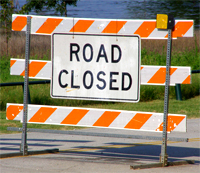 Massachusetts police officers assigned to protect public safety at roadside construction details are increasingly becoming the victims of car accidents themselves.
Massachusetts police officers assigned to protect public safety at roadside construction details are increasingly becoming the victims of car accidents themselves.
On Dec. 5, a Peabody police officer was struck by a 1991 Chevrolet pick-up truck while working on a Rte. 1 construction detail. He was thrown over the truck’s hood and transported to Massachusetts General Hospital with serious personal injuries. An initial police investigation found the driver was speeding, but it remains ongoing.
In recent years, negligent drivers have struck police officers on several construction details in Massachusetts and caused life-threatening personal injuries. In June 2010, state police Sgt. Douglas Weddleton was killed while working on a construction detail on Interstate 95 in Mansfield. The driver was charged with operating under the influence as well as other driving infractions.
Police officers are not the only ones vulnerable in construction site accidents. Construction workers as well as pedestrians, homeowners and others nearby are also at risk for injury, especially during night construction.
Drivers have a responsibility to operate with care in construction areas. Here are a few ways to make your travel safer:
Avoid Construction Zones If Possible. When you find a construction project on your daily commute, see if you can find an alternate route until work is complete. For projects in your local community, pay attention to your town’s government website and contact the police department’s business line if you have questions.
Identify Who Is In Charge of Traffic. Detail police officers typically direct traffic on many sites, but other work sites utilize civilian flaggers. The civilian flaggers should be dressed in fluorescent clothing and carrying traffic direction signs.
Give Other Drivers Space. Do not travel too closely behind other vehicles. It can be difficult to anticipate when another vehicle may stop short.
Slow Down. We all want to reach our destinations on time, but once you are stuck in construction traffic, it is best to take a deep breath and be as patient as possible to avoid a car accident.
Keep Your Eye on the Traffic. When there is a lot of activity going on at a construction site, there is a natural tendency to look at the crew and different machinery. But it is important to keep your eyes on the road.
Do Not Stop to Talk to the Detail Officer. Even if traffic volume is low, do not stop and ask the detail officer for help or directions. You are putting the officer at risk and confusing other drivers.
Avoid Construction Work Zones At Night. A large number of car accidents occur during night construction work because drivers are speeding, fatigued, operating under the influence or poor lighting.
Pedestrians and Cyclists. Like cars, it is also important for pedestrians and cyclists to follow the detail officer’s instructions for when to pass.
Read More
Thanksgiving Driving Safety
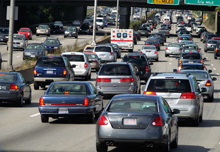 Thanksgiving is a special time of year when family and friends gather for tasty food and warm conversation. But before the turkey can be carved, many people have to travel. The majority of holiday travelers are driving. As they plan their trips, the National Highway Traffic Safety Administration (NHTSA) is urging travelers to buckle up through its campaign, “Buckle Up America. Every Trip. Every Time.” Other government agencies are stressing good planning to help drivers avoid motor vehicle accidents.
Thanksgiving is a special time of year when family and friends gather for tasty food and warm conversation. But before the turkey can be carved, many people have to travel. The majority of holiday travelers are driving. As they plan their trips, the National Highway Traffic Safety Administration (NHTSA) is urging travelers to buckle up through its campaign, “Buckle Up America. Every Trip. Every Time.” Other government agencies are stressing good planning to help drivers avoid motor vehicle accidents.
Seat Belt Use
During the 2009 Thanksgiving holiday travel weekend, 303 passenger vehicle occupants died in motor vehicle crashes, according to the NHTSA. The majority of these deaths occurred at night, making it important to buckle up at all hours.
Plan Travel Times
The Wednesday before the holiday and Sunday following are the busiest travel days. If possible, plan to travel at other times.
Massachusetts 511 Traffic Updates
Visit the Massachusetts 511 website before you travel. It reports on traffic, car accidents and travel conditions throughout the state. Click here for more information.
Fuel Up
Make sure your gas tank is full before you start traveling.
Slow Down
Expect to have to travel below the speed limit in heavy traffic and make sure not to follow other vehicles too closely.
Stay Calm
Expect to see aggressive drivers on the road. Move away and never engage them.
Drowsy Driving
Drowsy driving causes more than 100,000 car crashes each year, resulting in 40,000 injuries and 1,550 deaths, according to the NHTSA. Rest up before making the drive.
Read More
Focus on Seat Belt Use During National Teen Driver Safety Week
 Attention is on seat belts and occupant protection as the National Highway Traffic Safety Administration (NHTSA) observes National Teen Driver Safety Week from October 16 through October 22.
Attention is on seat belts and occupant protection as the National Highway Traffic Safety Administration (NHTSA) observes National Teen Driver Safety Week from October 16 through October 22.
Each year, the NHTSA hosts this week to educate the public on protecting teens behind the wheel.
The NHTSA reports teenage drivers and passengers are the least likely to wear seat belts. But seat belts are one of the most effective ways to travel safe. Most people who die in motor vehicle accidents are vehicle occupants, many of whom were not wearing seat belts. Less than 25 percent of traffic accident fatalities are pedestrians, bicyclists and motorcyclists, according to the NHTSA.
By contrast, in 2006 seat belts saved over 1,5000 lives nationwide among passengers over 4 years old, according to the NHTSA.
The NHTSA urges parents and teens to practice safety through seat belt use, by following graduated licensing laws, developing parent-teen contracts and avoiding alcohol consumption.
Massachusetts Junior Operator Law. Many states have implemented graduated licensing laws to place restrictions on teen driving. Under the Massachusetts Junior Operator Law, in the first six months of holding a license, operators under 18 cannot drive with another passenger under 18 years old. The lone exception is they can drive with a sibling as passenger. Teen drivers are also not allowed to drive between 12:30 a.m. and 5 a.m.
Parent-teen contracts. There is strength in a parent-teen contract when it comes to setting expectations. Contract forms are available from many insurance companies, auto clubs, state offices or you can develop your own. Click here for a parent-teen contract produced by the state of Massachusetts.
Address all areas of concern, including seat belt use, how many passengers are allowed in the car and how late teens can drive. This is important even if the state’s junior operator law covers all of your concerns. The contract is between you and your teenager to create an extra level of accountability.
Alcohol. While teens are below the minimum drinking age, they carry the greatest risk for death in an alcohol-related crash. In 2006, 31 percent 15- to 20-year-old drivers involved in fatal crashes had been drinking. This increases the importance of no-tolerance and accountability among parents, teachers, sports coaches and other respected adults.
Read More
Unsecured Truck Load Accidents Are Growing Problem in Massachusetts, Nationwide
 Unsecured truck loads are a growing problem endangering drivers across the country. Massachusetts has seen two of these fatal car accidents in the past two months.
Unsecured truck loads are a growing problem endangering drivers across the country. Massachusetts has seen two of these fatal car accidents in the past two months.
In 2004, the AAA Foundation for Traffic Safety reported 25,000 motor vehicle accidents are caused each year by unsecured materials on highways.
The problem is most prevalent in California, which had 32 million registered vehicles in 2007 – more than twice the number of any other state, according to the New York Times. The California state transportation department reported that over a two-year period between 2005 and 2007, 155 people were killed as the result of debris from unsecured truck loads.
In some of these fatal trucking accidents, authorities file criminal charges against drivers and other employees. When these motor vehicle accidents result from negligence, drivers and companies may also face wrongful death lawsuits in civil court.
Some states have strengthened the penalty for accidents involving tractor-trailers carrying unsecured loads such as construction equipment, building supplies, wood and furniture. Several years ago, Washington state passed Maria’s Law, named for Maria Federici, a young woman in her 20s who was blinded and disfigured when a piece of furniture flew off a trailer and smashed her windshield.
Maria’s Law made hauling an unsecured load causing injury a gross misdemeanor, carrying maximum penalty of one year in jail and a $5,000 fine.
In Massachusetts, a 27-year-old Lynn man died Sept. 19 when a 400-pound tire being hauled by a truck broke loose on Interstate 93 in Somerville. The truck was owned by Ryder Truck in Braintree and leased to Sullivan Tire. The tires spilled across the median and smashed the windshield of the Lynn man’s car, throwing his car toward a retaining wall.
The 2005 Freightliner M2 flatbed truck was carrying tires containing a tire fill. This material made them heavier than standard tires filled with air.
On Aug. 12, a backhoe fell off a National Grid truck traveling on Interstate 495 in Southborough. The backhoe struck a van, killing an elderly passenger and causing serious personal injuries to others in the vehicle.
Click here to read a 2007 New York Times article about unsecured truck loads.
Contact Breakstone, White & Gluck today
The Massachusetts motor vehicle accident lawyers at Breakstone, White & Gluck are experienced in handling complex traffic accidents involving unsecured truck loads on the highways. Our attorneys represent clients throughout Greater Boston, from Boston and Cambridge to Framingham to Worcester. If you have been injured, contact us today for a free legal consultation. We can be reached at 800-379-1244 or use our contact form.


